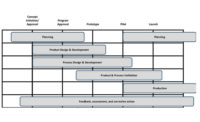ESPOO, Finland—A little positive feedback at work can go a long way toward improving assemblers’ long-term mental health and well-being. Engineers at the VTT Technical Research Centre of Finland and the European Factory2Fit research consortium are studying the effects of work performance.
VTT is developing a “worker feedback dashboard” that is currently being piloted by employees at Stera Oy, a contract manufacturer based in Finland. Other manufacturers involved in the three-year project include Continental AG and United Technologies Corp.
“In the increasingly digitalized working environments, employees easily lose sight of what they achieve at work,” notes Paivi Heikkila, a VTT engineer who is heading up the project. “However, positive feedback on work performance, as well as recognizing personal achievements and development at work are important for work motivation.”
The dashboard provides assemblers with personal feedback on how a shift is going. The application compiles feedback based on operational data from assembly line equipment and data on personal well-being collected using Fitbit activity trackers.
“Only the employee him- or herself has access to this data,” claims Heikkila. “The purpose of the application is to help people become aware of how smooth running of work affects their personal well-being and how their personal well-being affects their work performance. The application also encourages people to favor lifestyles that promote well-being.”
After each shift, a graphic trend figure plots how their day went. It helps operators recall if something special happened during their shift.
“It has been possible, for example, to analyze how they coped in an error situation and to reflect if they could do something
differently in the future,” says Heikkila. “In the long term, the application may help people find the personal style and way of working that suits them the best.
“Once we can increase people’s job satisfaction, the work efficiency will also improve,” notes Heikkila. “In the working life of the future, employees will increasingly take responsibility for their competence and for its development.
“The worker feedback dashboard supports this development by providing positive feedback,” Heikkila points out. “Monitoring of well-being at work and work performance supports individual on-the-job learning at a rate that suits the person in question.
“When we interviewed employees at factories, they often felt feedback as a negative thing, because the focus has been on such matters as the number of errors or the downtime of machinery,” says Heikkila. “With the worker feedback dashboard, [we want] to emphasize positive feedback that can raise spirits at work and have a positive impact on an employee’s job satisfaction and motivation.”






